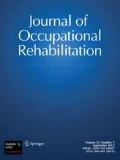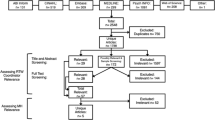Abstract
Purpose Although the role of return-to-work coordinators (RTW coordinators) is associated with reducing long-term disabilities, little has been written about their practices. The objective of this study was to clearly identify their tasks and activities and the stakeholders with whom they collaborate. Methods A cross-sectional survey was conducted using a web-based self-administered questionnaire. Participant inclusion criteria were as follows: (1) working for a large organization with 500 or more employees; (2) being responsible for managing disabilities and coordinating the return-to-work process; and (3) having been involved in coordinating the return to work of at least one person in the past year. Results 195 RTW coordinators completed the questionnaire. The three tasks or activities rated as most important were applying laws, policies, and regulations related to work absences and return to work; contacting the absent worker; and planning the return to work. A nursing or occupational health and safety training background significantly influenced the RTW coordinators’ practices. In addition, RTW coordinators collaborated mainly with workers and their supervisors. Conclusion Despite a wide variety of contexts and diverging definitions of competencies, a set of common RTW coordination practices appears to exist across industrialized countries. RTW coordinators with a training background in the health field seem better able to assimilate the various dimensions of work disability. Moreover, concerted action was found to be minimal and a far cry from recommendations. The practices defined could serve as a benchmark for describing RTW coordinators’ responsibilities in greater detail and allow for cross-organization and cross-country comparisons.

Similar content being viewed by others
References
Coutu MF, Durand MJ, Corbière M, Loisel P, Nastasia I, Lemieux P. Étude des déterminants de l’incapacité au travail dans une agence gouvernementale du Québec—Volet programme de réadaptation au travail [Study of work disability determinants in a Quebec government agency—Work rehabilitation program component]. Québec: Gouvernement du Québec; 2012.
Durand MJ, Corbiere M, Coutu MF, Reinharz D, Albert V. A review of best work-absence management and return-to-work practices for workers with musculoskeletal or common mental disorders. Work. 2014;48(4):579–89.
St-Arnaud L, Briand C, Corbière M, Durand MJ, Bourbonnais R, St-Jean M, et al. Retour au travail à la suite d’une absence en raison d’un problème de santé mentale—Conception, implantation et évaluation d’un programme intégré des pratiques de soutien [Supporting a Return to Work after an Absence for a Mental Health Problem: Design, Implementation, and Evaluation of an Integrated Practices Program]. Montréal: IRSST; 2011.
St-Arnaud L, Pelletier M. Guide soutenir le retour au travail et favoriser le maintien en emploi. Faciliter le retour au travail d’un employé à la suite d’une absence liée à un problème de santé psychologique [Guide to an integrated practices program for supporting a return to work and promoting job retention—Facilitating an employee’s return to work following an absence for a mental health problem]. Montréal: Institut de recherche Robert-Sauvé en santé et en sécurité du travail—Université Laval; 2013.
Franche RL, Cullen K, Clarke J, Irvin E, Sinclair S, Frank J, et al. Workplace-based return-to-work interventions: a systematic review of the quantitative literature. J Occup Rehabil. 2005;15(4):607–31.
Shaw W, Hong QN, Pransky G, Loisel P. A literature review describing the role of return-to-work coordinators in trial programs and interventions designed to prevent workplace disability. J Occup Rehabil. 2008;18(1):2–15.
Liberty Mutual Research Institute for Safety. Return-to-work coordinators: understanding their role (scientific update). From Res Real. 2012;15(2).
I Amsterdam—Amsterdam business. Human resources in the Netherlands. Frequently asked questions: Introduction to the basics. Amsterdam, NL; 2015.
Canadian Society of Professionals in Disability Management. Certification. Port Alberni, BC. 2015. http://www.cspdm.ca/certification/. Accessed 16 June 2015.
NSW Government. WorkCover. Australia. 2015. http://www.workcover.nsw.gov.au/workers-compensation-claims/medical-professionals/training-and-support/return-to-work-coordination-training. Accessed 16 June 2015.
Victorian WorkCover Authority. Compliance code 2 of 4: return to work coordinators, Melbourne, Australia; 2014.
Cheng A, Loisel P, Feuerstein M. Return-to-work activities in a Chinese cultural context. J Occup Rehabil. 2011;21:44–54.
Gardner BT, Pransky G, Shaw WS, Hong QN, Loisel P. Researcher perspectives on competencies of return-to-work coordinators. Disabil Rehabil. 2010;32(1):72–8.
Pransky G, Shaw WS, Loisel P, Hong QN, Désorcy B. Development and validation of competencies for return to work coordinators. J Occup Rehabil. 2010;20(1):41–8.
James C, Southgate E, Kable A, Rivett DA, Guest M, Bohatko-Naismith J. The return-to-work coordinator role: qualitative insights for nursing. J Occup Rehabil. 2011;21(2):220–7.
Bohatko-Naismith J, James C, Guest M, Rivett DA. The role of the Australian workplace return to work coordinator: essential qualities and attributes. J Occup Rehabil. 2015;25(1):65–73.
Tardif J. L’évaluation des compétences. Documenter le parcours de développement [Competency Assessment. Documenting the development path]. Montréal: Chenelière éducation; 2006.
Matthews LR, Buys N, Randall C, Biggs H, Hazelwood Z. Evolution of vocational rehabilitation competencies in Australia. Int J Rehabil Res. 2010;33(2):124–33.
Coutu MF, Nastasia I, Durand MJ, Corbière M, Loisel P, Lemieux P et al. Développement d’une approche systématique d’identification des déterminants de l’incapacité au travail liés au travail et à la santé psychologique des travailleurs dans un secteur ciblé [Development of a systematic approach for identifying the determinants of occupational disability related to the work and psychological health of workers in a target sector]. Montréal, QC: Institut de recherche Robert-Sauvé en santé et en sécurité du travail (IRSST); 2010.
Loisel P, Buchbinder R, Hazard R, Keller R, Scheel I, Van Tulder M, et al. Prevention of work disability due to musculoskeletal disorders: the challenge of implementing evidence. J Occup Rehabil. 2005;15(4):507–24.
Burton WN, Conti DJ. Disability management: corporate medical department management of employee health and productivity. J Occup Environ Med. 2000;42(10):1006–12.
Acknowledgments
This study was financed by the Institut de recherche Robert-Sauvé en santé et en sécurité du travail (IRSST).
Funding
This study was funded by the Institut de recherche Robert-Sauvé en santé et en sécurité du travail (IRSST) (Grant number 2012-0005).
Author information
Authors and Affiliations
Corresponding author
Ethics declarations
Conflict of interest
Marie-José Durand declares that she has no conflict of interest. Iuliana Nastasia declares that she has no conflict of interest. Marie-France Coutu declares that she has no conflict of interest. Michael Bernier declares that he has no conflict of interest.
Ethical Approval
All procedures performed involving human participants were in accordance with the ethical standards of the Research Ethics Committee of the Research Centre of Charles Le Moyne Hospital in Longueuil, Quebec.
Informed Consent
Informed consent was obtained from all individual participants included in the study.
Rights and permissions
About this article
Cite this article
Durand, MJ., Nastasia, I., Coutu, MF. et al. Practices of Return-to-Work Coordinators Working in Large Organizations. J Occup Rehabil 27, 137–147 (2017). https://doi.org/10.1007/s10926-016-9640-7
Published:
Issue Date:
DOI: https://doi.org/10.1007/s10926-016-9640-7




